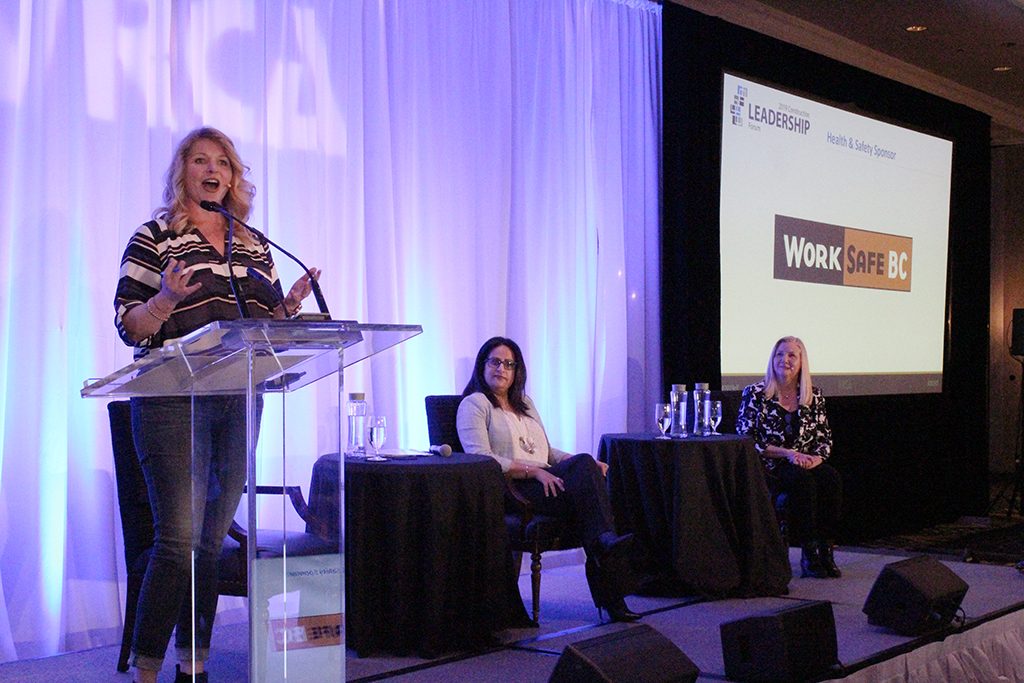Journal of Commerce | Warren Frey | May 10, 2019

A panel of mental health experts took a hard look at the emotional landscape of the industry and its workers recently at the Vancouver Regional Construction Association’s Construction Leadership Forum in Whistler, B.C.
WorkSafeBC senior manager in industry and labour services Trudi Rondou, Construction Industry Rehabilitation Plan executive director Vicky Waldron and Scott Construction mental health committee former co-chair Donna Grant spoke about programs currently in place and the further work that is required to implement mental health initiatives in construction.
Waldron said she came to the construction industry from health care and observed that mental health and substance abuse issues weren’t being addressed.
“More than that, it was considered normal,” Waldron said.
She added she looked at medical journals and researched the problem only to find no information existed at the time regarding mental health in the construction industry and decided to collect data herself and then present it to the entire construction industry.
“We found 83 per cent who came to see us had significant mental trauma and 90 per cent had childhood trauma. We don’t normally see these numbers in health care,” Waldron said.
At the same time, Waldron said, the opioid crisis hit British Columbia. A recent Fraser Health study found men aged 20-59 working in the skilled trades suffered death by overdose more than any other industry.
“at this point in the construction industry we have to recognize there is something going on,” Waldron said. “With opioids, people will talk to their peers about it because using is so wide spread but won’t speak ‘vertically’.”
Grant said the industry is already stretched and mental health will cost billions per year.
“Add that to a labour crisis and you’ve got a problem,” Grant said.
Stigma keeps workers silent about mental health problems and improper word choices such as being called “weak” or to “just deal with it” silence those workers who may then choose to self-medicate, she said.
“Can we change the way we talk about this” Can we change our word choices?” Grant added.
While mental health is a concern some associations and companies are responding to the challenge, she said, namechecking the VRCA, the BC Construction Safety Association and her own former position at Scott Construction.
Creating a mental health committee or similar initiatives doesn’t have to be resource-intensive, Grant said.
“You don’t have to have a lot of money, maybe you don’t need any money, but you can use a lot of online information and be a bridge to other resources,” she said.
What is needed, she said, is volunteers, quarterly meetings and a budget. Volunteer commitment at Soctt Construction means attending four meetings, assisting with the roll-out of the program and discretion.
“Scott Construction president Darin Hughes says we aren’t doing this for any competitive advantage. It should spread to every company in the industry,” Grant said.
WorkSafeBC created a mental health committee for first responders in British Columbia which conducted research on stigmas surrounding mental health.
The initative was the first of its kind in B.C., Rondou said, using in-depth interviews, as well as focus groups conduction in person, by telephone and online.
The conclusions reached, she said, were that stigma exists for first responders around mental health and has negative consequences particularly when workers self-stigmatize.
“What really resonated was the culture needs to change for first responders, and I would suspect it’s the same in construction,” Rondou said.
She also recommended using what WorkSafeBC’s first responder program as a use case when appealing to senior leadership.
“It can be difficult, and we’ve the templates for you to present a case,” Rondou said.
Waldron pointed to the need for companies and associations to adapt to behavior rather than changing it, citing the success of an Australian “mate” program where rather than targeting a suicidal person for help, one of their work peers intervenes. The program has resulted in a drop in suicide rates.
“When we say ‘emotionally reserved’ we mean ‘men’. And while men don’t like to talk, they do like to help,” Waldron said.
“We would love to get to a place where men will talk about their emotions, but we’re not there now. Rather than trying to get people to do what they don’t want to do, let’s talk to their mates,” she added.
More generally, the culture of the industry has to change, Waldron said.
“It’s something where people are looking the other way, and it has to be on the agenda as part of the conversation,” she said.
“It takes courage. There’s been times when we see something on the work site that doesn’t sit right, and how many times have we just walked past that?” Rondou said.


